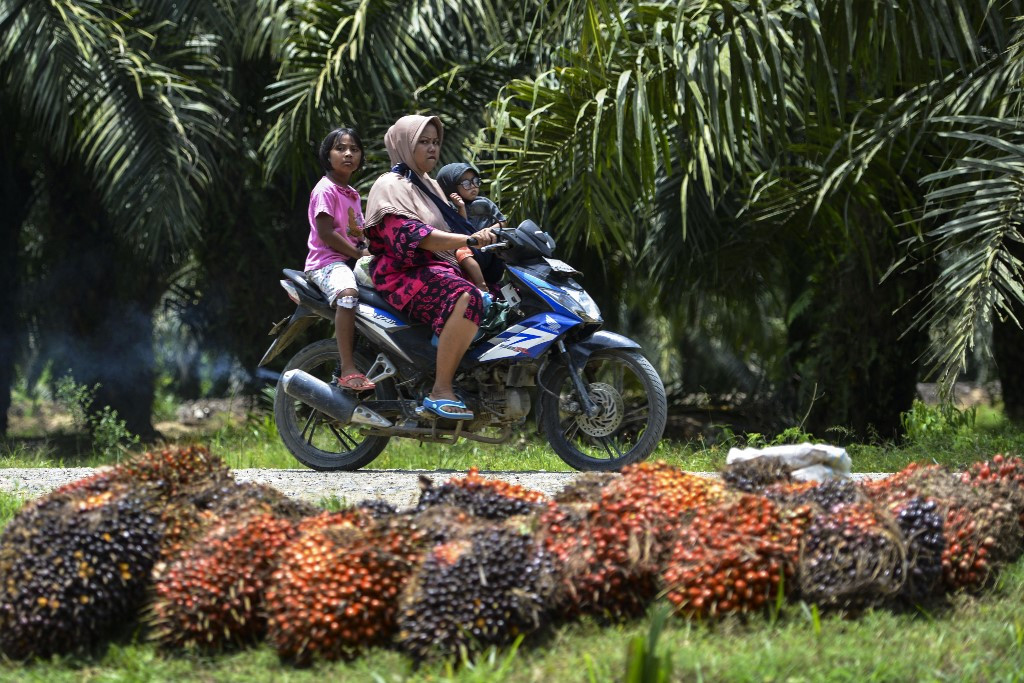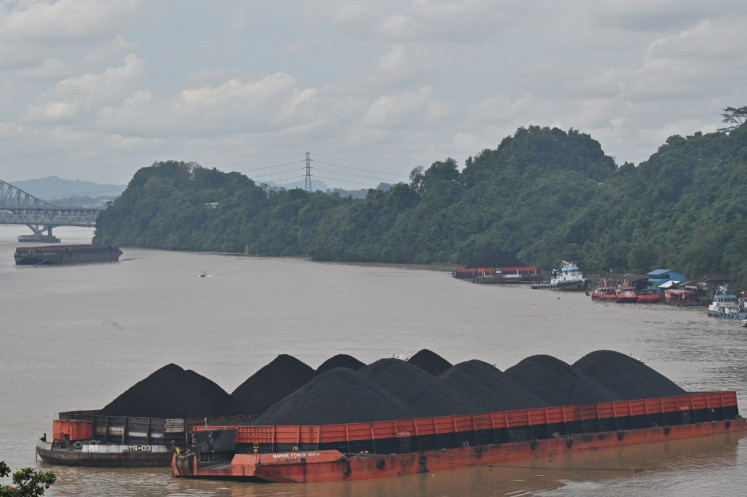Time to review biodiesel policy amid skyrocketing crude, palm oil prices
With the backlash over the latest revelations from the BPDPKS on how the surcharge funds on palm oil exports were channeled, it is clear that a comprehensive and integrated policy on CPO and biodiesels is urgently needed.
Change text size
Gift Premium Articles
to Anyone

Controversy has never ceased over the palm oil industry. It induces either extreme love or hate.
It is loved by Indonesian smallholder growers and big plantations for its productivity, cost effectiveness and product versatility, especially as global palm oil prices have more than doubled over the last two years.
But the commodity has been incessantly attacked in Europe and the United States through boycott campaigns, which allege that oil palm estates are responsible for massive deforestation in Indonesia and create unfair competition against other vegetable oils from developed countries.
At home, the industry has been slammed over the last three months by consumer organizations for alleged cartel-like practices in the cooking oil market and even investigated by the antitrust agency (KPPU) over possible abuse of market power by the largest producers.
Long lines of consumers looking to buy cooking oil at the government-set retail price of between Rp 11,500 (80 US cents) and Rp 14,000 per kilogram have been common sights in many cities, despite the draconian government policy of imposing a domestic market obligation (DMO) of 30 percent of the export volume on crude palm oil (CPO) producers.
The DMO requires CPO producers to sell the commodity at a fixed price of Rp 9,300/kg, less than half the free market price of $1/kg. The price for DMO olein is fixed at Rp 10,300/kg.
The big question, though, is why the government is still unable to control cooking oil prices at its retail price range, when the palm oil industry association has claimed that household and industrial cooking oil consumption only amounted to 9 million tons of the 56 million-ton national CPO output in 2021.
Some analysts say the debacle is the result of the government’s ad hoc policy approach to exploit palm oil.
While the Trade Ministry remains embroiled in a tug-of war with cooking oil producers and distributors, another controversy erupted from a recent report by the Oil Palm Plantation Fund Management Agency (BPDPKS). The agency was established in mid-2015 to manage funds from a surcharge imposed on palm oil exports when international palm oil prices are higher than the fixed price ceiling.
The BPDPKS recently reported to the House of Representatives that almost Rp 140 trillion had been collected cumulatively from palm oil export surcharges between 2015 and 2021 under the CPO funding scheme. Almost 80 percent of this amount, or Rp 110.3 trillion, was used to subsidize biodiesel and only 5 percent (Rp 6.6 trillion) was allocated for replanting smallholder oil palm estates.
In 2021 alone, subsidies for biodiesel (diesel blended with CPO) totaled Rp 51.8 trillion, up significantly from Rp 28 trillion in 2020 and just Rp 3 trillion in 2019, as a result of skyrocketing CPO prices over the last two years and the increase in the biodiesel mix to 30 percent CPO (B30).
The association of smallholders, which account for around 40 percent of the estimated 16 million hectares of oil palm estates, cried out, protesting strongly that the fund’s use was not in line with the main objective of the CPO support fund to enhance palm oil sustainability through replanting smallholder estates with higher yield seedlings and research and development.
Several analysts even immediately blamed the current turmoil in the cooking oil market on using CPO for biodiesel, whereas only around 9.3 million kiloliters of biodiesel were produced in 2021.
The question, then, is whether the huge subsidy is still worthwhile. According to the energy ministry, last year’s biodiesel consumption of 9.3 million kiloliters saved only Rp 66.5 trillion in imported diesel.
Under the current circumstances, pressure is mounting to review two aspects of the CPO support fund, namely the surcharge rate and the fund’s intended use.
First, the extra levy on palm oil exports has been a burden on producers, big plantation firms and smallholders. For example in September 2021, when the global CPO price was $1,185/ton, CPO producers were levied almost 30 percent, or $341, consisting of $175 for the CPO support fund and $166 in export tax.
The proportions of the levy intended for the support fund and as export tax should therefore be set at a maximum 15 percent of the CPO market price under the progressive pricing scheme. The surcharge and the export tax are similar in nature. Lower dues will allow CPO producers, notably smallholders, to invest in improving their yield and sustainability.
Second, the use of the CPO support fund should be refocused to prioritize stabilizing the retail prices of cooking oil for low-income consumers and replanting smallholder plantations with high-yield seedlings to increase their productivity, which is still half as high as their Malaysian counterparts. Environmentalists have suggested that if the productivity of smallholder plantations could be increased, Indonesia would not need to expand plantations at the risk of damaging forests.
Another priority should be research and development into sustainable palm oil.
As the prices of both CPO and crude oil have now reached historical highs and will likely remain at peak prices because of the geopolitical fallout from the war in Ukraine, biodiesel will need even bigger subsidies.
Continuing or even expanding the biodiesel program will not contribute greatly to palm oil development because the majority of the biodiesel subsidies are enjoyed by the largest palm oil groups with integrated palm oil industries anyway.
Palm oil biofuels have become less commercially feasible for renewable energy today, because of the commodity’s versatile use in food and a myriad of other consumer goods. Food and fuel will continue to compete fiercely over CPO, especially because CPO has become increasingly popular as a vegetable oil.
The current emergency situation calls for comprehensive and integrated policies, as the wide disparity between the prices of CPO in the market and under ad hoc DMO policy is vulnerable to overseas smuggling, considering the archipelago’s vast and porous coastlines.
***
The writer is a sustainable palm oil analyst.









